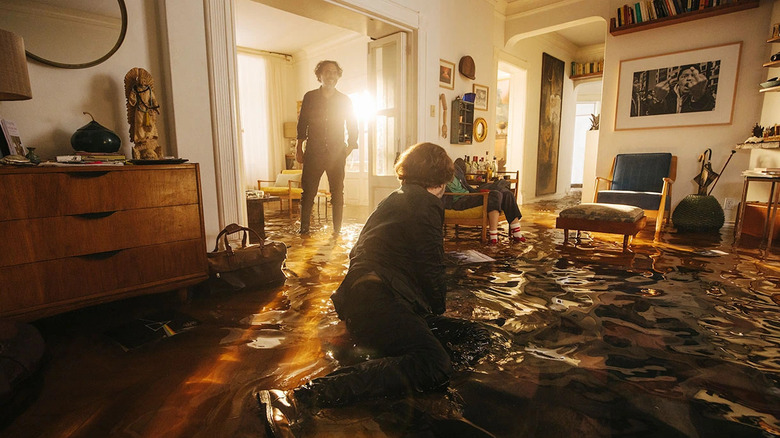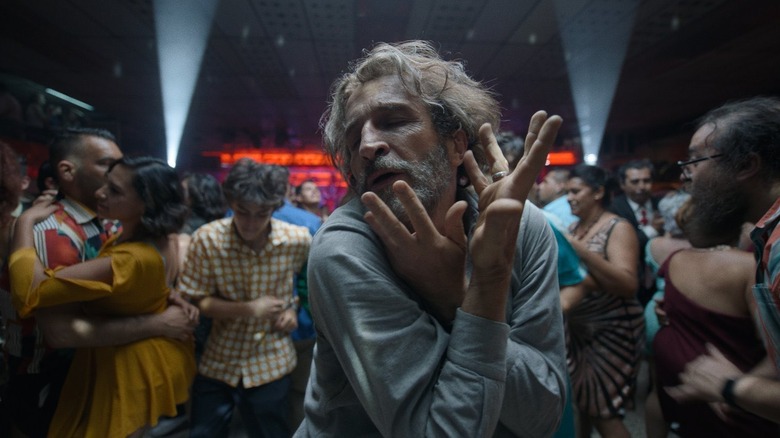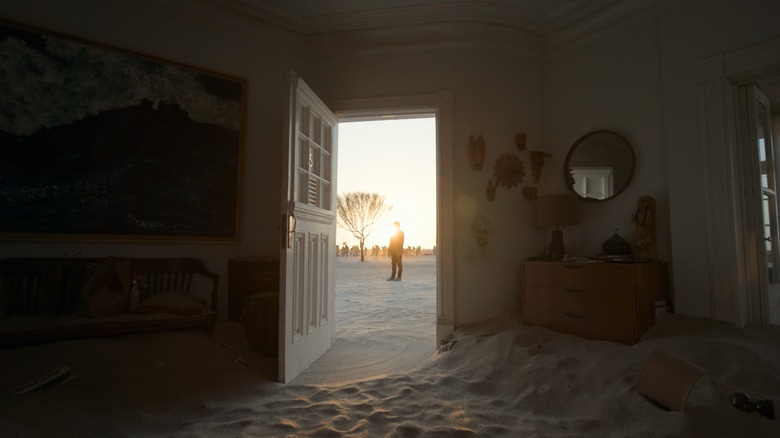Bardo Review: Alejandro González Iñárritu's Felliniesque Fantasy Falls Flat [Venice]
Alejandro G. Iñárritu, who has been enabled with five Oscars, indulges his most frustrating tendencies in his latest film "Bardo (or False Chronicle of a Handful of Truths)." It's all the wallowing self-pity of "Biutiful" combined with the self-aggrandizing insistence on pure artistry from "Birdman," filtered through the blank verse roving camera used to stupefying effect in "The Revenant." Here is a filmmaker convinced of his destiny as heir to Fellini's throne, with no one to reign in his most bombastic instincts or tell him no.
The result of Iñárritu's ego going completely unchecked is this three-hour monument to his own prowess and perspective. "Bardo" is an incoherent grab-bag of visual metaphors delivered with all the subtlety of a sledgehammer. To Iñárritu's credit, he never misses a moment to remind the audience that he is, in fact, doing the absolute most behind the camera to make his presence palpable. But such endless pontification with only the slightest hint of profundity can sap even the most virtuosic visuals of their power.
Faux Fellini
Iñárritu's "Birdman" showed traces of his reverence for Federico Fellini's auto-fictional meta movie "8 ½." But there's scarcely an attempt to hide the influence — nay, imitation — in "Bardo." Daniel Giménez Cacho's Silverio, an artist on the verge of professional and personal collapse contemplates his priorities, makes for an obvious stand-in for the director's own anxieties and aspirations. (In case there was any doubt, Iñárritu styles his protagonist as identically to his own visage as Christopher Nolan did with Robert Pattinson in "Tenet.")
To further the genuflecting before the great Italian filmmaker, "Bardo" derives its structure from another of his seminal works: "La Dolce Vita." Yet that sweet slice of contemporary urban life has never seemed so sour as it has in Iñárritu's picaresque tale, which folds the past, present, and future of the filmmaker's native Mexico into a kaleidoscopic trip. Silverio, also a journalist by trade, would make for an excellent guide through the country's history and mystery if he was ever able to get out of his own way. His encounters with colorism, colonialism, and a cloistered youth do provide an occasional bit of insight into a wider national narrative. Iñárritu thinks he's distilled Mexico into one man but he's only diminished the story to just himself.
Maximalism overload
This diminutive perspective clashes with the visual style of the film, which is always opting for more. While Iñárritu ditches his most recent director of photography Emmanuel Lubezki for Darius Khondji, the ponderously poetic point of view remains the same. They insist on filming practically every scene in "Bardo" through a wide-angle lens, blowing out the image and filling the frame with even more detail. (As if there were any worry the audience would want for more in a 174-minute film.)
The style pulls liberally from Lubezki's collaborations with Terrence Malick, particularly "The Tree of Life." Yet their ethereal aesthetic rings entirely hollow when Malick's inquisitive heavenward gaze is replaced by Iñárritu's smug self-satisfaction. It's appropriate to represent the warped worldview of "Bardo" given that the film gives vibrant expression to Silverio's subjective sights. But when they reach for anything more, it's a chaotic clash of sound and fury that mistakes loudness for lyricism.
Iñárritu is a filmmaker capable of conjuring bold, beautiful imagery yet is incapable of conveying them with the subtlety of anything lighter than a wrecking ball. The most fantastical flights of imagination in "Bardo" are quite literally accompanied by big brass music. His gravitation toward grandiosity is so overwhelming that it robs the film's more intimate sections of any oxygen. Any scenes with Silverio's wife and two adolescent children are clearly thin sketches compared to the grand canvases he sprawls elsewhere. When Iñárritu's two sensibilities must coexist, such as during a tender farewell to a lost child, the attempt at simple sincerity immediately sputters out.
Do you want to build a straw man?
Weirdly, the most piercing critique of "Bardo" may not come from any like-minded critical appraisers watching Iñárritu's latest braggadocious boondoggle. As he did in "Birdman," the filmmaker anticipates the most salient lines of attack that could be made against his work ... and has a character deliver them directly in the film. Yet these arguments are posited by figures he establishes as untrustworthy, impure, or somehow corrupt. It's a debate with a straw man of Iñárritu's own creation. (And adding insult to injury in "Bardo" — he quite literally silences his critics when Silverio decides he will hear no more.)
Whether talking to himself or talking at his audience as if delivering wisdom deserving of an inscription on stone tablets, Iñárritu has nothing new or interesting to say. He's established he can move a camera with astonishing fluidity as well as blur fantasy and reality seamlessly. Now what? "Bardo" is a film high on its own supply yet low on any sense of actual intrigue or intuition. For the filmmaker, he's breathing in his own narcissism. The audience? They're breathing in his exhaust fumes.
/Film rating: 3 out of 10



